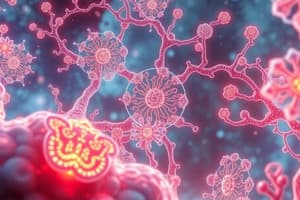Podcast
Questions and Answers
What type of stem cells can differentiate into any type of cell in the body?
What type of stem cells can differentiate into any type of cell in the body?
- Bone marrow cells
- Adult stem cells
- Embryonic stem cells (correct)
- Meristems
Adult stem cells are found only in the brain.
Adult stem cells are found only in the brain.
False (B)
What is therapeutic cloning?
What is therapeutic cloning?
The creation of an embryo with the same genes as a patient to obtain stem cells.
Meristems in plants are found in the ______ and ______ tips.
Meristems in plants are found in the ______ and ______ tips.
Which of the following is a potential use for embryonic stem cells?
Which of the following is a potential use for embryonic stem cells?
Match the type of stem cell with its characteristic:
Match the type of stem cell with its characteristic:
Stem cells can be used without any ethical considerations.
Stem cells can be used without any ethical considerations.
What is a benefit of stem cell research?
What is a benefit of stem cell research?
Flashcards
What is a stem cell?
What is a stem cell?
A cell that can divide and differentiate into different types of cells with specialized functions.
What are embryonic stem cells?
What are embryonic stem cells?
Stem cells found in early embryos that have the potential to differentiate into any cell type in the body.
What are adult stem cells?
What are adult stem cells?
Stem cells found in adult tissues that can differentiate into a limited range of cell types.
What are meristems?
What are meristems?
Signup and view all the flashcards
What is therapeutic cloning?
What is therapeutic cloning?
Signup and view all the flashcards
What is a benefit of stem cell research?
What is a benefit of stem cell research?
Signup and view all the flashcards
What is a problem with stem cell research?
What is a problem with stem cell research?
Signup and view all the flashcards
How can meristems be used for plant cloning?
How can meristems be used for plant cloning?
Signup and view all the flashcards
Study Notes
Stem Cells
- Stem cells are undifferentiated cells that can divide to create more similar cells, some of which will develop different functions.
Types of Stem Cells
Embryonic Stem Cells
- Formed when an egg and sperm fuse to create a zygote.
- Can differentiate into any cell type in the body.
- Scientists can direct these cells to differentiate into various cell types in a lab.
- These cells have the potential to replace damaged cells in conditions like diabetes and Alzheimer's, or replace nerve cells for spinal cord injuries.
Adult Stem Cells
- Found in bone marrow, among other locations.
- Can differentiate into various cell types, including blood cells.
Meristems (Plant Stem Cells)
- Located in plant root and shoot tips.
- Can differentiate into any plant cell type during the plant's life.
- Can be used to make clones of plants, useful for preserving desirable traits (like disease resistance) or for rare plant conservation.
Therapeutic Cloning
- Involves creating an embryo with the same genetic material as a patient.
- The embryo's stem cells can be harvested and used for treatment.
Benefits of Stem Cell Research
- Potential to replace damaged or diseased body parts.
- Using unwanted embryos from fertility clinics.
- Advancement of understanding cell differentiation.
Problems of Stem Cell Research
- Limited understanding of the differentiation process.
- Stem cell removal destroys the embryo.
- Ethical and religious objections regarding interference in reproduction processes.
- Risk of contamination with viruses.
- Alternative areas of medical research may be more fiscally sound to pursue.
Studying That Suits You
Use AI to generate personalized quizzes and flashcards to suit your learning preferences.




